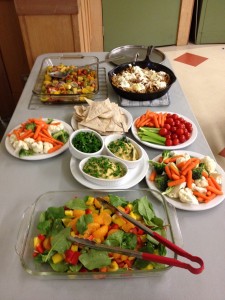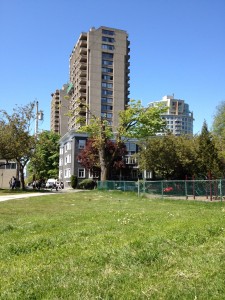When I began my first day of work at Gordon Neighbourhood House (GNH), I felt unsure about a number of things. I had only a vague idea of what sort of work I might be doing as a volunteer in two different programs, I had no good ideas about what my final project might look like, and I did not have a clue where my inspiration was going to come from. There were only two things that I felt confident knowing: I am a volunteer and I am a student researcher. As for the rest of my doubts and confusion, I thought to myself, “Let the pieces fall where they may”. Surely my research would work itself out.
When I introduced myself to my program supervisor on the morning of my first shift, I explained my dual role with ease. Yet, after 11 hours of meeting GNH members, chopping vegetables and blending hummus for a communal meal, and doing my best to ensure the two-year-olds at “Weekend Family Place” stayed away from the street, things became even less clear. I was so concerned with plunging into my work as a volunteer, I was not sure whether I had fulfilled my duty as an ethnographer. My struggle in establishing an even balance between two roles had shaken my confidence about my position at GNH.
When at GNH, I am first and foremost a volunteer. I am fortunate enough to have been welcomed into the organization, and am there to do whatever most benefits them. I wanted to ensure from the first day that everyone I interact with knows that I am also a student working on developing a final project. Because my role as student researcher shapes so much of my experience, I began with a naive assumption that others would show an active interest in my work. On the morning of my first shift, we introduced ourselves one-by-one, and I told everyone about my position. Everyone smiled at me, but no one asked further questions. I was then asked what my favourite food is. “My mom’s cheesecake,” I replied. That remark elicited much more of an excited response.
The most challenging component of my fieldwork thus far has been establishing a balance between participant and observer. In participating, however, I began to feel as though I was missing opportunities to do research. My own understanding of my role felt further confused when I approached a woman in one of my programs and asked her if she would be willing to do an interview with me one day, exploring conceptions of home and community. She nodded politely, and immediately proceeded to get up and leave the room. Panic set in. Will I be able to collect enough data if I spend my time busy making crafts with kids or cleaning dishes? In a chapter in FieldWorking by Chiseri-Strater and Sunstein, I found a quote by Margaret Mead that resonated with my own experiences:
“The fieldworker must choose, shape, prune, discard this and collect finer detail on that… But unlike the novelist…the fieldworker is wholly and helplessly dependent on what happens…One must be continually prepared for anything, everything – and perhaps most devastating – nothing.”
I was terrified of discovering nothing. It is not always possible, nor does it always offer the best insights, to be constantly asking questions or watching from the background with a pen and notepad. One personal learning curve in my work is to grow comfortable with the process of observing things as they happen. Simply being at the fieldsite allows for a deeper understanding of the place and the unspoken side of the culture that the place comprises. At my fieldsite, as at all places, sometimes this means that “nothing” happens at all.
Works Cited:
Bonnie Stone Sunstein & Elizabeth Chiseri-Strater 2007. Fieldworking: Reading and Writing Research. Bedford/St. Martins.


